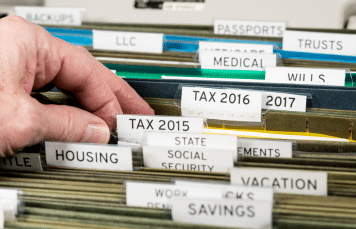Why the Deceased Still Need Document Shredding
 As a kid, I had the job of picking up our family’s mail from the local post office. I remember that we occasionally got mail for my grandfather, Frank, who had the same last name as us, but didn’t live in our home. Frank died when I was only two years old, so I didn’t really know him, but his mail was sent to our mailbox for many years following his death.
As a kid, I had the job of picking up our family’s mail from the local post office. I remember that we occasionally got mail for my grandfather, Frank, who had the same last name as us, but didn’t live in our home. Frank died when I was only two years old, so I didn’t really know him, but his mail was sent to our mailbox for many years following his death.
When someone close to you dies, the last thing on your mind would be that the deceased person could be a target for fraudsters and identity thieves. The identity of someone who has passed away is valuable, and so even after they die, their private information still needs to be protected. Identity thieves will use their information to open credit card accounts, apply for loans or open cell phone plans, all of which could leave the deceased person’s estate responsible for payment.
Undetectable Theft
It’s more challenging to detect theft of the deceased’s person’s identity because they can no longer monitor their own information and identity. That responsibility is likely now in the hands of someone who is already preoccupied with protecting their own information and identity and all of the other tasks of daily living. Plus, it can take years before fraud is flagged on a deceased person’s credit report, giving plenty of time for fraudsters to do their damage and disappear.
If you have the responsibility of monitoring and protecting the private information for a deceased family member or friend, here’s a list of which documents to keep and which should be destroyed, along with the appropriate timeframes for each.
- Never destroy. These documents should never be destroyed and should be kept in a secure location. They are prone to theft, being misplaced or accidently destroyed.
-
- Birth certificates
- Social security cards
- Divorce decrees
- Death certificates
- Legal wills
- Marriage certificates and prenuptial agreements
- Retirement plan documents
- Insurance documents
- Destroy immediately. These documents can be destroyed immediately following death.
-
- Credit card and insurance offers
- ATM and sales receipts
- Paid utility bills
- Expired warranties
- Paid billing statements
- Maintain any bills until they are paid and then destroy
- Destroy after one year.
-
- Non-tax-related bank and credit card statements
- Pay stubs
- Receipts for large purchases
- Investment statements
- Destroy after seven years. These financial documents should be saved for seven years after you file any required estate taxes.
-
- Account statements
- Tax returns
- Retirement benefits
- Tax-related receipts
- W-2s
- Destroy after 10 Years. To avoid paying unnecessary medical bills covered by insurance, maintain these documents for a decade after death, and then they can be safely destroyed.
-
- Health insurance cards
- Medical tests
- Prescriptions
- Medical history
- Hospital discharge papers
Protection of the Deceased’s Identity and Estate
The decision to dispose of vulnerable documents at the right time is a good step towards avoiding an identity theft nightmare, but unless the documents are impossible to read or reconstruct, disposing of them isn’t enough. Use a professional shredding company for the complete and secure destruction of these sensitive documents. They will guarantee that the information can never be used for criminal purposes.
Richards & Richards provides walk-in and drop-off shredding as well as residential shredding options so your loved one’s personal documents can be safely and securely shredded. Our NAID AAA Certified shredding services will help protect you from identity theft headaches. Call us at 615-242-9600 or complete the form on this page. We’ll be happy to answer any questions.
